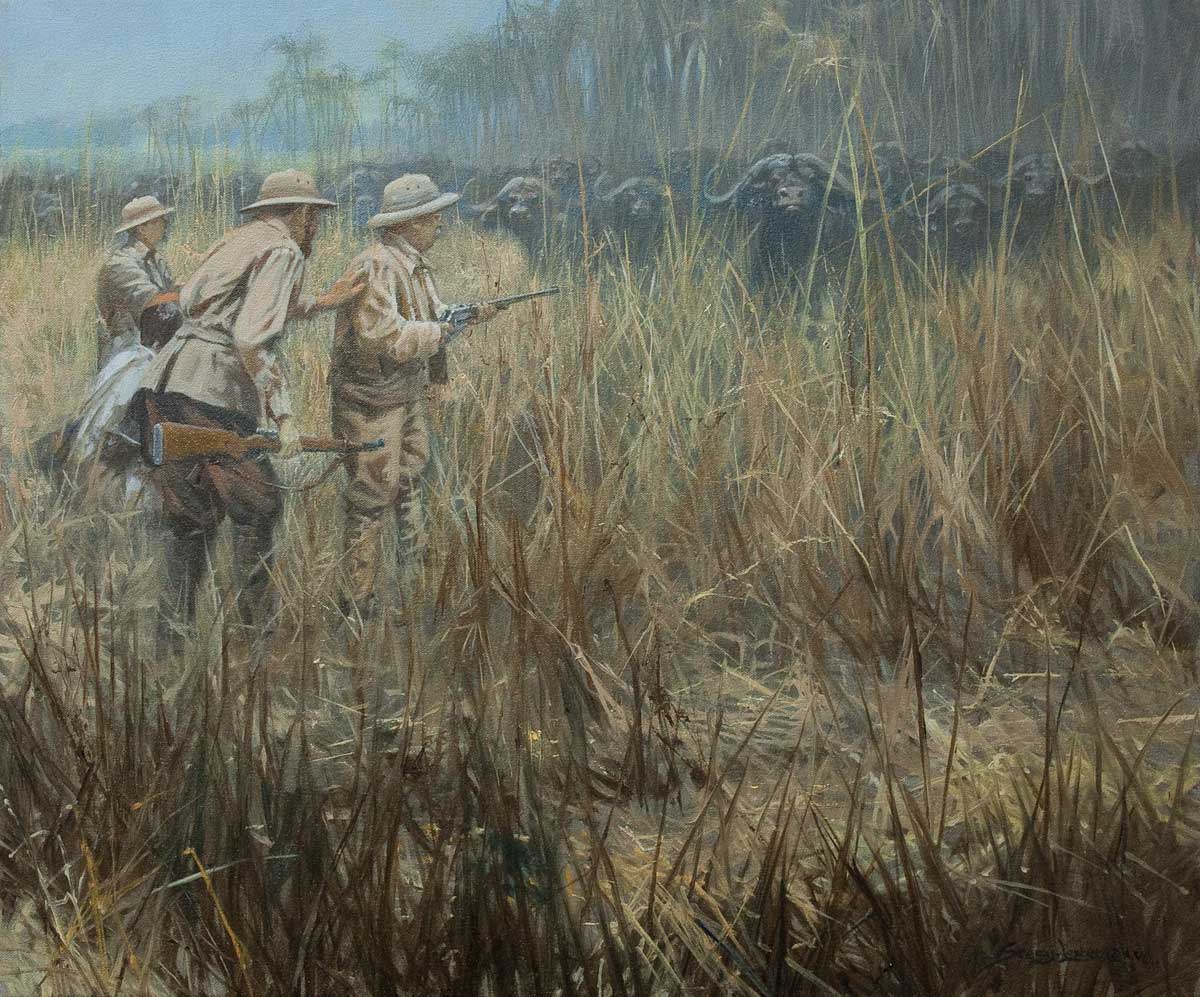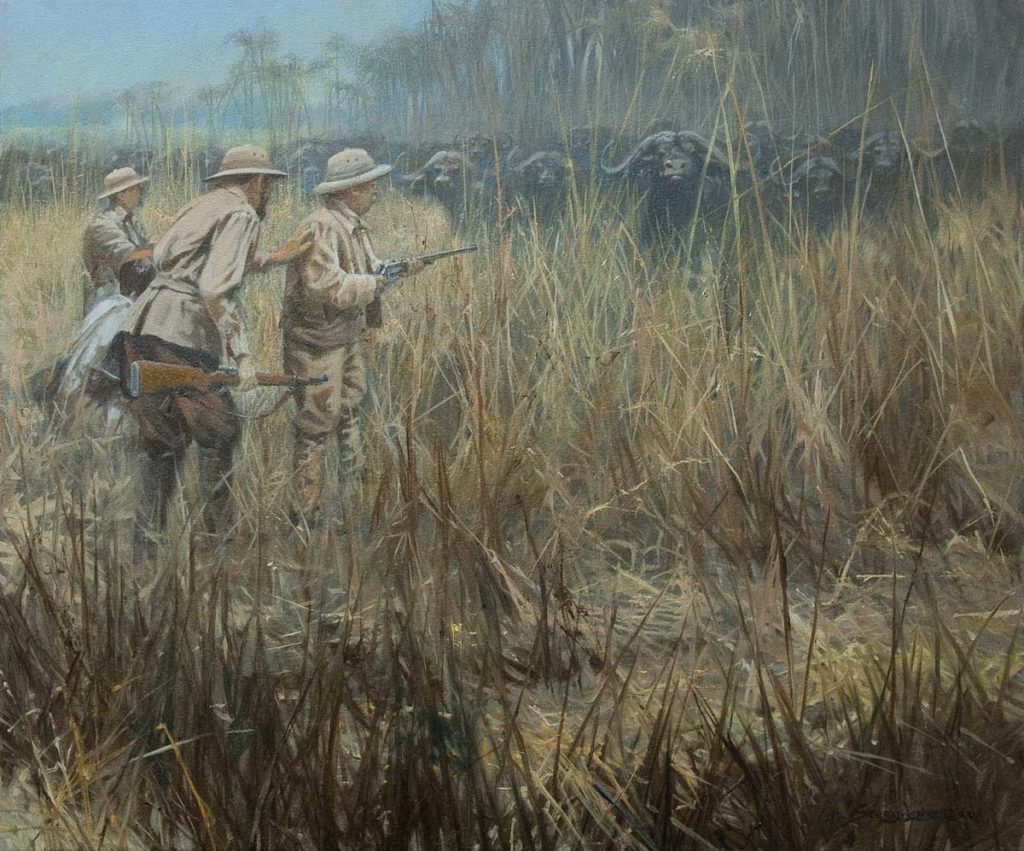 Those days are long since over. Today’s African outfitter hunts a finite area with increasingly limited options for moving on. Whether a manicured game ranch or a government or tribal concession, it is increasingly incumbent upon today’s operator to manage his or her area for sound and sustained yield. Potential revenue is dependent almost entirely on that sustained yield. This is actually a positive in modern Africa, because it makes management an essential component. This is not unique to the hunting industry. Photo and ecotourism supports wildlife management in Africa’s “beautiful” areas: National Parks and specialized areas such as Botswana’s Okavango. The difference is that we crazy hunters are willing to pursue our passion—and support wildlife—in marginal lands that are less beautiful and offer less density of wildlife and poorer species diversity.
Those days are long since over. Today’s African outfitter hunts a finite area with increasingly limited options for moving on. Whether a manicured game ranch or a government or tribal concession, it is increasingly incumbent upon today’s operator to manage his or her area for sound and sustained yield. Potential revenue is dependent almost entirely on that sustained yield. This is actually a positive in modern Africa, because it makes management an essential component. This is not unique to the hunting industry. Photo and ecotourism supports wildlife management in Africa’s “beautiful” areas: National Parks and specialized areas such as Botswana’s Okavango. The difference is that we crazy hunters are willing to pursue our passion—and support wildlife—in marginal lands that are less beautiful and offer less density of wildlife and poorer species diversity.
Today, sound management includes habitat improvement and mitigation of uncompensated losses. The balance between the two depends on the area. A private land operator in southern Africa may have the luxury of focusing on water and food source development, with protection limited to relatively simple fence patrol and increasingly expensive actual guarding of key species such as rhino. An operator in a bigger, wilder area is obligated to limit losses—read poaching—through formalized meat distribution, investment in community projects and effective antipoaching.
 Meat distribution of legally taken game reduces both need and desire for poaching with its inherent risks. Properly done, it also carries a stick as well as a carrot: Penalties for villages that produce or harbor poachers. Community projects range from development of clean water sources and agricultural assistance to building of schools and clinics. Antipoaching, well, that‚Äôs a matter of boots on the ground–easier said than done.
Meat distribution of legally taken game reduces both need and desire for poaching with its inherent risks. Properly done, it also carries a stick as well as a carrot: Penalties for villages that produce or harbor poachers. Community projects range from development of clean water sources and agricultural assistance to building of schools and clinics. Antipoaching, well, that‚Äôs a matter of boots on the ground–easier said than done.
Although popular (and sensationalized) media is now making antipoaching a cause célèbre, it’s really nothing new. Smart outfitters have been doing it for decades, some purely for survival, others because it’s the right thing to do, and most for both reasons. Antipoaching is a matter of presence, off-season and in. It has three essential elements. First, an outfitter with the will. Again, across wild Africa most hunting is done on marginal lands, not in premium enclaves. If the hunting outfitters weren’t there guarding their game and their investment, there would be no protection at all. With the vast majority of hunting safaris now conducted on private lands in the continent’s southern tip, many hunters who have been to Africa don’t understand this, but we as hunters must understand it and be outspoken in our support of the concept.
The second element is funding which, you guessed it, comes from us, the customers. Have you pondered why hunting in wild Africa is costlier than hunting private lands in the south? Area rental is one factor and complicated logistics another. Funding extensive antipoaching effort is yet another! And, often, an antipoaching percentage of profits or a specific surcharge is simply not enough to get the job done. I have seen generous clients and organizations (including, of course, SCI!) donate equipment and build schools, and I’ve personally donated both funds and barter (such as whitetail hunts in Kansas) to raise funds for antipoaching.
The third essential element is the antipoaching unit. It takes equipment and training, both of which require the first two elements‚Äîwill and funding‚Äîbut it also takes dedicated personnel. They must be paid, again requiring the first two, but they must be special people–courageous and dedicated. As a general problem, they often do not participate in the tips shared by more visible safari workers such as trackers, skinners and camp personnel. (Keep this in mind on your next safari: Remember the antipoaching unit!) But they work as hard or harder, patrolling vast areas on foot, sleeping on the ground and accepting greater risks against an increasingly better-armed and more dangerous threat.
It is not glamorous work, and most of time it’s not exciting work. Much of it is like any other patrolling, like law enforcement or military: A matter of constant and unpredictable presence, leaving boot prints and rolling up snares and collecting gin traps as fast as they can be laid. It’s hot, dusty, thirsty work…and in the rainy season, cold, wet work. This past September my team and I spent some time in coastal Mozambique with Coutada 11’s antipoaching unit, led by a remarkable young man named Craig Windt. We were struck by the similarities his job might have to a young military officer or provincial policeman charged with maintaining order in any vast and semi-hostile region. His portfolio included planning patrols and ambushes; training; maintaining discipline; and perhaps above all, motivating his “troops.” There is one difference: He lacked the specific rule of law behind his ad hoc organization, so decisions made could have far-reaching implications.
Our purpose was to make a documentary of an outfitter-funded antipoaching unit, perhaps exemplary, but not uncommon in today’s wild Africa. The result, which we hope you’ll have a chance to view, is not sensationalized in any way. We didn’t ask our people to pretend to be “poachers” and we didn’t borrow skins and skulls from the trophy shed to set up “poacher’s camps,” although I’ve seen this done. Our program is a legitimate journalistic documentary. I have no stake and no profit, but it’s available to SCI chapters, and may be a good tool in swaying non-hunters. To schedule a free viewing in your home, at a chapter meeting or in any setting with non-hunting friends, please contact Gary Swingle in our Membership Department at [email protected]. Hey, we did catch poachers, and shots were fired, but mostly it’s a matter of painstaking patrolling—boots on the ground—reading sign, and good old investigative work. As any soldier or law enforcement officer will tell you, this means days and weeks of boring routine, only occasionally spiced by a surge of crystal-clear adrenaline.
This work is ongoing right now across most hunting areas in wild Africa, directed by good outfitters, funded by hunters like you and me, with the effort on the ground led by young men like Craig Vent. Effective antipoaching by hunting outfitters is the primary reason why hunting country remains a bastion for Africa‚Äôs wildlife. The forces against selective sport hunting in wild Africa have grown stronger. Unfortunately, even many hunters (who have no interest in Africa) don‚Äôt understand that Third World governments lack the resources, even if the will exists. We as hunters must understand, or African game will continue to shrink into the tiny but select enclaves where it can be protected by a less generous ecotourism industry.–Craig Boddington

